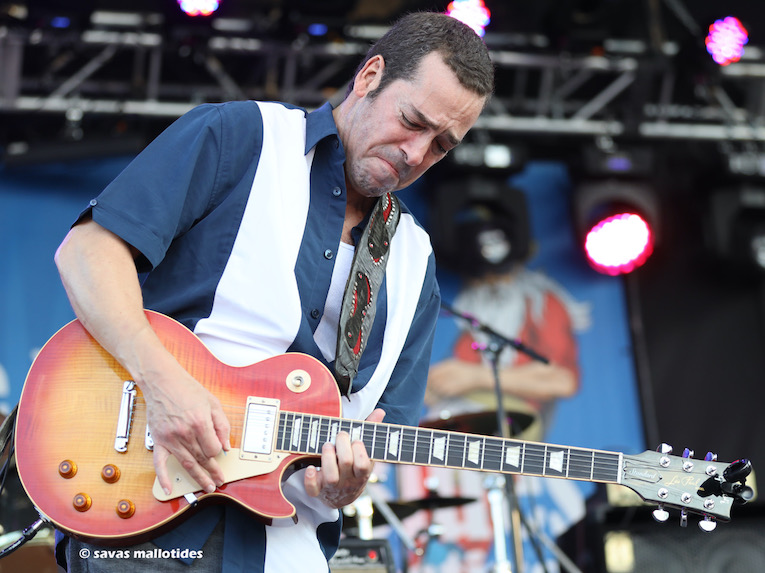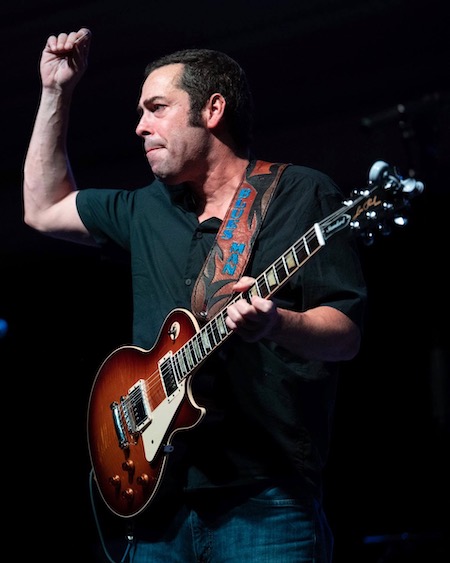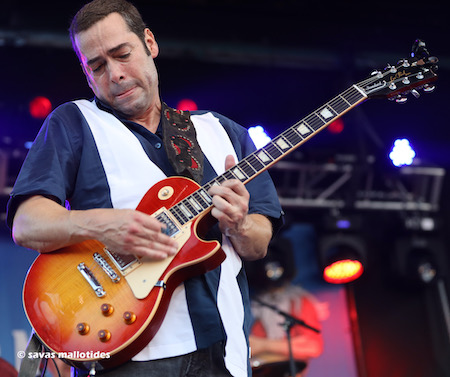
Photo: Albert Castiglia by Savas Mallotides
By Martine Ehrenclou
Good things come to those who wait, especially if you’re an extraordinary blues/rock guitarist, singer, songwriter like Albert Castiglia. His new album I Got Love hit #1 on Billboard Top US Blues Albums chart. His last album Masterpiece (2019) took home “Best Blues Rock Album” at the 2019 Blues Music Awards and Albert was nominated for “Blues Rock Artist of the Year.” Talk about keeping the blues alive.
Miami-raised Castiglia served an apprenticeship while backing legendary blues musician Junior Wells and later went on to work with singer Sandra Hall. He embarked on a solo career that’s yielded many critically acclaimed albums and consistent praise for his exceptional instrumental chops, his searing vocals and live performances that generate life-long fans from all over the world. Miami’s New Times called Castiglia South Florida’s “Best Blues Guitarist” and USA Today said, “It’s a revelation to discover the thrilling retro-electric blues from this astonishing young guitarist.”
Castiglia’s new album I Got Love was released on March 25 via Gulf Coast Records, produced by Gulf Coast Records guitarist and co-owner Mike Zito. Showcasing blistering blues-drenched tracks, the album is a musical essay documenting the last two years of Albert’s life during the COVID-era, including the highs and serious lows. He calls I Got Love his truth.
Albert said, “We had just gone under lockdown and things dried up a little bit. We had to figure out how to get through the year because I’d lost a significant amount of income. We got through it. In the midst of that whole thing, that’s how I Got Love came about. Money’s not as important as just having a support system, I believe. If you have the support system then you could get through tough times, and that’s what that song (title track) was about.”
Like all musicians, Castiglia’s tours were shut down. After the money he’d saved ran out, he started teaching Zoom lessons and doing virtual gigs. He took a few gigs in Florida out of necessity and admitted to being very cautious in the beginning about where to play. By December of that year, the money ran out and he could not afford to be as selective as he had been.

Photo: Albert Castiglia by Laura Carbone
Albert caught COVID in January of 2021. He said, “It messed me up real bad. I don’t think the actual COVID was as bad as the long-haul symptoms that I was experiencing after that. After quarantine, I did my first gig in Fort Myers, a festival, and couldn’t get out of bed the rest of the week. It took that much out of me. In February, March, April, I was working once or twice a week doing gigs. I didn’t feel anything during the gig, but the next day, I couldn’t get out of bed. I was getting pins and needles in my hands and my feet, and my back of my neck was burning up. I had bouts of exhaustion and fatigue that would just come out of nowhere. This went on for like three or four months.”
Since I Got Love is about his life during the COVID shutdown, I wondered if it was healing for him to write and record the songs.
“Oh, absolutely,” he said. “I felt like I needed a release from some of the frustrations of the previous two years. For instance, when I had to take more work, I got criticized for working during the pandemic. There were people that didn’t want me to play. They wanted me to stay home, or they wanted me to find another job. They didn’t want me to go out and play in clubs because they thought I was just going to contribute to spreading the virus. I remember someone posting on my fan page, telling me to be part of the solution and not the problem.”
I said, “Albert, you had to work.”
“That was the thing,” Albert shared. “You do your best under the circumstances and that’s how ‘Freedomland’ came about. It was a song about there not being any real black and white in this world, especially in the last two years. Everybody’s had their own set of problems. There was a lot of judgment being thrown at everybody for the choices they made, when really everybody has their own life they have to live, and they have to figure out a way to survive.” He continued. “That was a perfect example of how the writing was so healing for me.”
I asked him about a couple of songs on the album that spoke of people criticizing him on social media.
Albert said, “’Burning Bridges’ and ‘Take My Name Out Of Your Mouth’ were social media-inspired songs. People were so mean to friends of mine. There’s this debate now that seems to be picking up steam in the last couple of years, about who should be playing blues. The Black, white issue. I guess Rolling Stone had just put out an article about the whitewashing of blues. While that argument may be valid to a certain degree, there were people that were incredible advocates of blues music and African American music that were being attacked, that didn’t have to be attacked. Kim Wilson, for instance, he was attacked unnecessarily.
“He posted on Facebook a post with various pictures of his heroes, who were all Black. He spoke about how they had pushed him to keep doing it, and inspired him to play, and supported him in his musical endeavors. One of these groups had twisted what he had said, making it sound like he was saying it was okay to culturally appropriate. He was being unnecessarily bashed. Those two songs culminated from that.”
I asked Albert if he wanted to get into this topic in the interview, if he felt comfortable with it.
Albert said, “It doesn’t bother me. I’m going to tell you a story. I had just joined the Junior Wells Band, and we were on a blues cruise in 1997. We were on break, and Junior’s road manager, Michael Blake Moore, asked me to keep him company for a bit while he took care of some business. We sat together at a bar and hung out. Junior told me stories of the road, and his adventures with Earl Hooker, and growing up in Chicago, and stuff. Then he turned to me, and he asked me about what my plans were. He said, ‘Well, what do you plan on doing with this music?’ I wanted to stay with him for the rest of my life. I would’ve. All I wanted to be was a Chicago blues musician. I just told him, ‘Man, you hired me, Junior. I want to be with you for the rest of my life.’ Junior said, ‘Well, I don’t expect you to be in this band forever. What I need you to do is keep your eyes open, and your ears open, and your mouth shut, and learn as much as you can from me and the band. Because you’re going to have your own band someday, and it’s going to be your responsibility to keep the blues alive.’
Albert continued. “That was Junior Wells telling me this. One of the godfathers of Chicago blues. When he told me that, it was my mission from that point on to keep the music alive. I feel that I’m doing that in my own way. Now, whether people like how I’m doing it, that’s their problem. If people got into a Lefty Dizz song or a Muddy Waters song because of a version that I did, then I’m doing my job. If I can write original music as well, then I’m doing my job, but you may not like how I do my job. There’s many ways you can keep the blues alive. There’s so many ways of doing it, either in the blues raw vein, or in the Delta blues, or Piedmont or West Coast swing blues, or Chicago blues. And it’s all great.

Photo: Albert Castiglia by Savas Mallotides
“Now, what I do believe is there does need to be more African American representation in the blues. There definitely needs to be more Black participation. There definitely needs to be more Black artists in festivals, but I don’t think cutting other people out of it is the answer. I think we need to get it in schools. I think it’s tragic that there aren’t at least two blues courses in music curriculum in colleges all over the country. There should be a blues music history course and a blues theory course in every music program in the country.”
I agreed.
Albert continued. “Why jazz? Music schools and colleges, they barely want jazz in there, but jazz is acceptable. Why not blues? Why can’t we do this? That’s the kind of thing that needs to be. I mean, this cultural appropriation argument, if that kind of energy was put towards the education thing and exposing it to more African Americans, I think we could make a difference. We could keep it alive that way, instead of deciding on who deserves to be doing it, and who doesn’t.”
I added “I like your idea of getting it into schools. High schools too. Blues history courses.”
“Absolutely,” Albert said. “It boggles my mind why they’re not talking about this. That’s the problem. I think Ole Miss has a couple classes. There’s nothing about blues in colleges, in music schools in colleges, in music programs.”
I mentioned Joe Bonamassa’s Keeping The Blues Alive Foundation and how it funds projects, scholarships and grants that preserve music education for the next generation. They also donate to a school every week in need of instruments, sheet music, supplies and more “in the effort to uphold the rich culture and history of the Blues as a true American art form.”
Albert said, “It wouldn’t surprise me that he’s doing that. I think Joe’s doing a lot of great things. He’s really reached out and helped some great musicians that needed breaks.”
We agreed and discussed Joanna Connor’s album and Larry McCray’s album that Joe Bonamassa and Josh Smith produced and released on Keeping The Blues Alive Records.
I asked Albert about his focus on truth and being vulnerable in his music, both with I Got Love and his last album, Masterpiece. “What do you hope others will take away from your music?”
Albert said, “That they can speak about their truths, and that’s what blues is all about. I am not qualified to sing about the struggles that Muddy Waters, or James Cotton, or Junior Wells went through. I can’t speak about the Black experience. I can’t sing about what it was like to grow up in the Jim Crow South, or things of that nature. I can write about things that affect me in my life. Hopefully, that’ll resonate with other people. I would encourage other artists to sing about their truths and write about their truths. That’s what made me want to be a musician, the honesty of the writing. That’s what I want people to get out of it.”
Mike Zito and Albert Castiglia are currently on their “Blood Brothers Tour.” For tour dates see here.
For more information on Albert Castiglia see his website here.
Listen to “Double Down”

Great interview. Enjoyed hearing you in The Villages!
Congratulations on your most recent success! Quite a thrill I imagine. You’re #1
Love the interview! It was great to meet you and have a few minutes to talk when you and Mike visited Omaha. You put on a great show. You make this Gables kid proud!
Great interview. Albert is the best. He has the ability to become the hometown hero to every town he plays in.